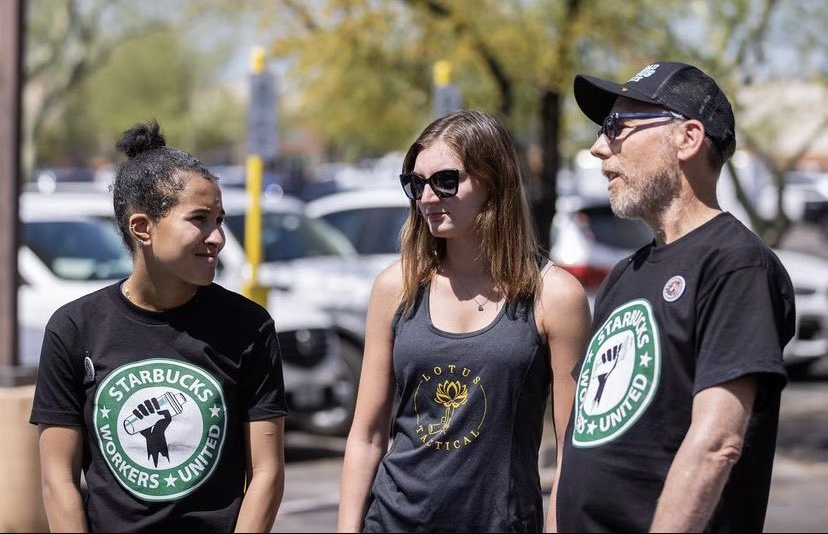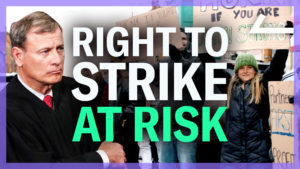By Jordan Zakarin
In mid-to-late January, Alyssa Sanchez asked her manager at a Phoenix, AZ Starbucks if she could modestly scale back her work schedule. She wanted to move from at least five days a week to four days per week.
The manager said it wouldn’t be a problem — until a few days later, when word got out that Sanchez was part of a growing effort to unionize the store.
Suddenly, the slight alteration that Sanchez requested “didn’t fit the needs of the business,” according to her manager, even when coworkers offered to pick up her shift. The manager continued to place Sanchez on the schedule five days a week, and was unbowed when questioned about it.
“My manager said, ‘People’s availability requests are only that, just requests,’ and she’s not obligated to follow those,” Sanchez tells More Perfect Union.
Sanchez’s coworkers happily picked up a few of those shifts for her, but that was suddenly deemed against Starbucks policy.
“She said, ‘You need to come in or I’m gonna give you all these write-ups,’” Sanchez recalls. “And so she started threatening me with all of these write-ups and saying that it wasn’t going to work out and at that point, I was like, I don’t know what else you want for me.”
The choice was presented in no uncertain terms: If she wanted to keep her job, Sanchez would have to give up her dream of attending flight school, which was the impetus for the schedule change. It was all or nothing, an odd ultimatum to be handed down at Starbucks, a company that touts its schedule flexibility and friendliness to part-time work.
Within days, Sanchez was sending a resignation email demanded of her by the manager, eliminating one crucial vote for a union that was just getting off the ground.
In March, the National Labor Relations Board issued a formal legal complaint against Starbucks for the illegal union-busting that the company has inflicted on the organizing workers at the Scottsdale and Mayo store in Phoenix. Much of the complaint centered on the relentless harassment of shift supervisor Laila Dalton, who has since been fired by the company. But the NLRB also cited Starbucks’ improper treatment of Sanchez, which it termed a “constructive discharge,” and is seeking to have her reinstated at a job she held for two years.
“It was so upsetting,” Sanchez says of the firing. “I loved the customers and the work itself, and when I got fired, not only did it affect me financially, but also my college education was riding on that job. So as soon as I lost the job, I lost my education, and I lost the daily contact with my co-workers that made me really happy — we were more like a family.”
After time spent serving in the Air Force reserve officer training program, Sanchez began Starbucks’ online tuition benefit at Arizona State University to continue pursuit of her bachelor’s degree. Now, she has to put her education on pause again in the middle of her junior year. She’s now looking for a new job and trying to stay involved in the union movement at the store, which has now lost four key leaders.
In addition to Dalton and Sanchez, a barista named Sofia Lugo was forced out of the company after management refused to make small changes to a schedule that would still have six days available to work. Tyler Gillette, another barista, was forced to go on long-term leave after the manager reneged on small accommodations to make it far easier to work with their autism. The NLRB also included Gillette’s unfair treatment in its complaint.
The sudden retirement of former CEO Kevin Johnson triggered the Starbucks’ multi-billionaire founder, Howard Schultz, as the company’s interim CEO at the beginning of April. Over the past few weeks, under Schultz’s direction, the company has increased the intensity of its union-busting and frequency of its firing pro-union workers. Starbucks has terminated workers in Michigan, Denver, and North Carolina over the past week, along with an outspoken union leader in Buffalo.



